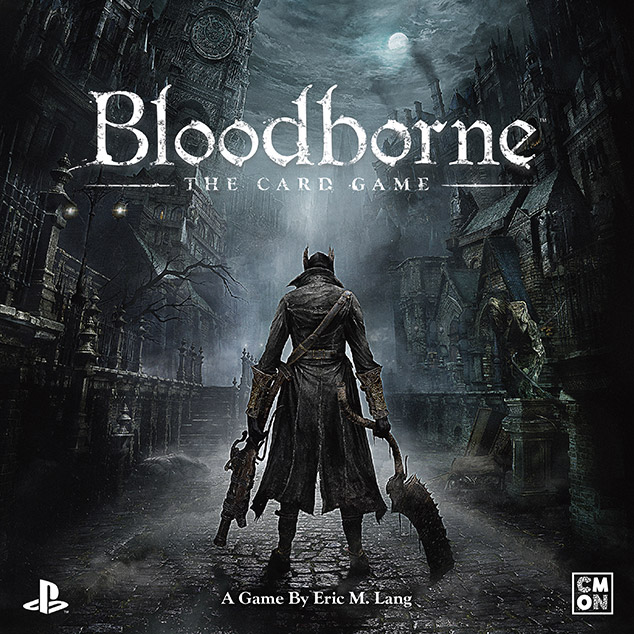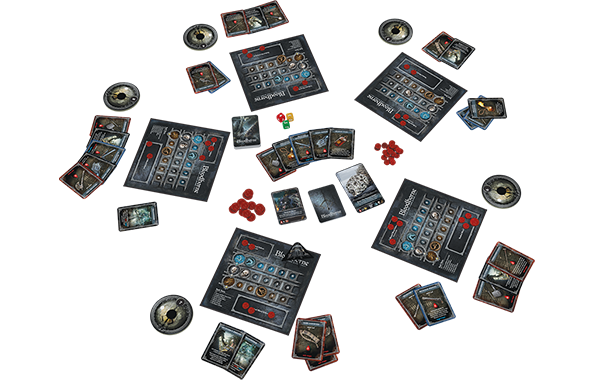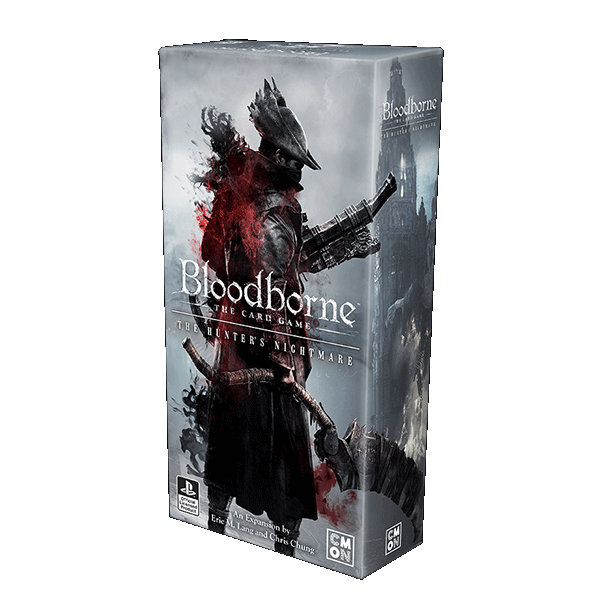 |
| Bob Richardson |
A bloody good time?
08.22.17 - 2:08 PM
Bloodborne: The Card Game is a soft cooperative/competitive deck-builder that loosely resembles its licensed property. Designed by Eric M. Lang and published by Cool Mini or Not (shortened as CMON), Bloodborne is an excellent medium-light-weight game featuring strong elements of luck, planning, and prediction. While fun for several playthroughs, the limited content of this well-designed game has left this reviewer and his friends wanting, since the core mechanics and balance have been a joy to explore and master. Fortunately, if you can find a copy online, the price is right at around $30 or less.

What is the card-based version of the critically acclaimed action RPG all about, anyway? Those familiar with deck-builders may be expecting the typical pool of cards for purchase in the center of the table with five card draws every turn, as is common within the genre. Bloodborne departs from this formula in an exciting way, though. Unlike others, Bloodborne allows players to have full access to their hands at all times until cards are played. Discarded cards can be retrieved upon playing the Hunter's Dream card, which also restores health, halves damage from enemies, and is the primary way players will be earning upgraded weapons or items from the center of the board. Gameplay is starkly simple: an enemy card is flipped up, players decide what card they want to play in secret, players reveal their chosen cards once everyone has selected, the enemy attacks the players with a die roll, and then the players attack the enemy. If the enemy is killed, everyone who participated in combat earns a trophy. Trophies are one way in which victory points are earned. Damage dealt to enemies earns players blood tokens, each of which is one victory point. After ten enemies are killed and then the final boss, the game is over and all players add up their points to see who won.

That's really the entire game. Some finer points exist, but that's essentially it. That may sound terribly simple – because it is. The key strategy lies in pressing one's luck in the right moment, choosing the right upgrade for the situation, and, my favorite, predicting what card other players will use. You see, players attack enemies in turn order, and if a player does not do damage to an enemy, he does not earn a trophy, which can result in critical point loss. Every enemy counts as each game involves killing ten enemies and a boss, which lasts about 30 to 45 minutes. First player rotates each round, but even if someone is in the last position, they may choose to use a pistol, rifle, or molotov which hits before most other weapons. However, other players may predict this and plan to use weapons or items to exploit these ranged weapons. And, thus, the mind games and taunting begin.

The luck component lies not just in what enemies crop up, which can alter one's strategy significantly, but in how much damage each enemy deals. Three differently colored dice determine the likelihood of enemies dealing little or huge amounts of damage. Each die has the capacity to be re-rolled, which can add damage with each subsequent roll, generating a level of tension. Even the weakest die can result in 8 or more damage, which is the maximum possible health for any character. Death in Bloodborne isn't game-ending in most cases, but can mean significant point loss. Dying acts a lot like using Hunter's Dream, except that players lose all of their points that haven't been safely banked and they do not add their discarded cards to their hands. The good news is that anyone who dies can immediately upgrade, which acts as a reasonable catch-up mechanic. About banking, though – when one dreams, which players should multiple times in one game, earned blood tokens get safely banked away. Otherwise, those points can be stolen with certain key items or lost if a monster fells a hero. So, if you choose to fight an enemy with 3 health left, you may very well succeed in your greed, but losing all of your unbanked blood echoes is reasonably possible.
Finally, the upgraded weapons are probably the most fun part about Bloodborne. Five weapons and items are always revealed in the center to be earned upon dreaming or dying. These powerful weapons can range from four whole points of damage (the Kirkhammer), to doubling the damage players take from enemies if the players use a melee weapon that round (the Flamesprayer). While no direct damage items exist in this game, some weapons assault all other players if they meet certain conditions. Another note about upgrades is that the final boss in each round, which is randomly selected of five, can drastically alter the strategy players employ. For instance, one boss reduces the maximum health of players by two, while another heals players every round. These sorts of abilities, while ostensibly simple, can impact gameplay significantly.

I truly enjoy Bloodborne: The Card Game, and will likely table it for years to come when my friends and I want a softer, more casual game to play in between heavy games, or because we're running out of time for the day. Unfortunately, fans of the lauded video game may find discord in that an otherwise hardcore gaming experience is synthesized into an admittedly lightweight game heavily reliant on luck. The dice rolls and pacing of upgrade reveals may cause players to throw their hands up in outrage, but if Bloodborne is appreciated for what it is – a medium-light, quick game – then tempers should be abated. When my friends and I fell upon bad luck, we swore, laughed, carried on, and moved on with the game. We had a great time, even when unlikely misfortune befell someone. If this sounds like something you might enjoy, don't worry about whether or not you've played Bloodborne. For how inexpensive it is, Bloodborne: The Card Game is worth a purchase.
Titled Bloodborne: The Card Game - The Hunter's Nightmare, this expansion will include new monsters, bosses, and weapons, and introduces Runes and Death Tokens as new gameplay elements. More information will be revealed leading up to release, but for now, here's the box art:

You can learn more about the Bloodborne: The Card Game and buy yourself a copy from its official product page on CMON.